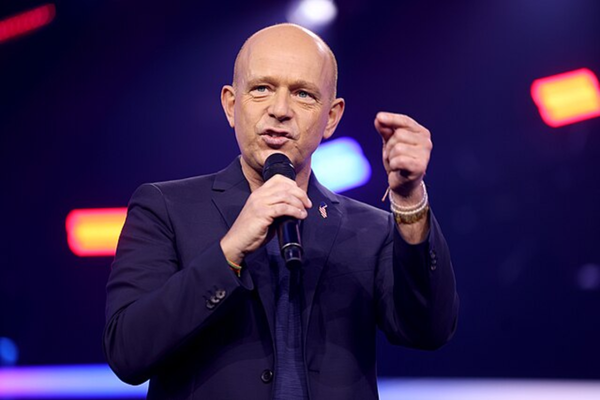Plaintiff, a Republican political operative, had sued the ACU president for allegedly groping him:
In his time involved with the Republican Party, plaintiff "has served political campaigns and political committees as a field coordinator, field director, grassroots director, and political director, among others." While working for one of these campaigns as a political staffer, plaintiff alleges that, "[o]n October 19, 2022, a high-profile person in conservative and Republican Party politics committed a sexual battery upon [him] in Georgia." This sexual battery incident became more public on January 6, 2023, when the Daily Beast ran an article detailing the sexual battery incident, without naming plaintiff, and "[o]ther media outlets picked up the story, and the incident became widely known" [link -EV]. Although the Daily Beast and the other media outlets did not identify plaintiff's name as the victim, plaintiff asserts that "many in the political and journalism communities were aware of his identity."
Caroline Wren, herself a Republican political operative,
was aware of plaintiff's identity and began attacking plaintiff on Twitter in the wake of the Daily Beast story. Specifically, defendant allegedly made false statements about the type of work that plaintiff did for the campaigns he worked on, and she accused plaintiff of being "fired from multiple campaigns for lying and unethical behavior" and for being a "habitual liar." Because of these allegedly false and defamatory statements, plaintiff claims he "suffered damages, including … embarrassment, humiliation, distress, and reputational harm."
Plaintiff then sued Wren for libel, and Chief Judge Beryl Howell (D.D.C.) in Doe v. Wren (1) allowed him to go forward pseudonymously, and (2) "prohibited [Wren] from publicly disclosing plaintiff's identity or any personal identifying information that could lead to the identification of plaintiff by nonparties, except for the purposes of investigating the allegations contained in the Complaint and for preparing an answer or other dispositive motion in response." Here's the justification Chief Judge Howell gave for pseudonymity (all the quotes above and below are from the opinion):
First, as the description of plaintiff's claim makes clear, plaintiff does not seek to proceed under pseudonym "merely to avoid … annoyance and criticism," but to "preserve privacy in a matter of [a] sensitive and highly personal nature." Although the substance of plaintiff's claim concerns public statements made by defendant on Twitter, these statements are inextricably tied to plaintiff's allegations of sexual assault against a third-party. Courts have routinely found that allegations of sexual assault implicate sensitive and highly personal matters, and they have permitted those plaintiffs to file their complaint by pseudonym. Given the ties between plaintiff's claim here and his claim of sexual assault against a third party, the first factor weighs in favor of permitting plaintiff to proceed anonymously….
Plaintiff [also] points out that the third-party he accuses of sexual assault is a high-ranking person in well-known advocacy organizations that are active in Republican and conservative political circles, and defendant was "a key organizer of the January 6, 2021, 'Stop the Steal' rally that led to the attempted insurrection at the United States Capitol." Given that defendant and the third-party appeal to a portion of the population who could view plaintiff's allegations as a political attack, release of plaintiff's name potentially "poses a risk of retaliatory physical or mental harm to the requesting party." …
[P]aintiff seeks to vindicate only his own rights, and anonymity appears to be necessary to provide him the opportunity to do so without compounding the public revelations defendant already allegedly made about the sexual assault against plaintiff by identifying him in this litigation.
For whatever it's worth, as best I can tell from searching based on a Tweet quoted in the Complaint, the plaintiff appears to have been fired several days ago from a job as a N.C. legislative staffer because of his past appearances on what seems to be a "pro-white" radio show; he is also apparently the same person who wrote a letter to a judge in support for a higher sentence for a Jan. 6 defendant. These aren't directly legally relevant to the libel case, but I would think these are normal things that journalists who cover the libel case might want to write about, and that the defendant could legitimately want to continue writing about; that helps illustrate the problems with pseudonymous litigation in such cases, and with the gag orders like this in particular.
More broadly, I think it's hard to justify the gag order, which directly restricts even accurate speech by Wren. That is especially so because the order appears to have been issued without giving Wren notice and an opportunity to appear to argue against it (see Carroll v. President & Comm'rs of Princess Anne (1968)). And Doe's alleging that he was a victim of groping can't justify the restriction; indeed, even subsequent punishment of the publication of the names of outright rape victims is generally unconstitutional (see Florida Star v. B.J.F. (1989)), so a prior restraint against the publication of the names of alleged groping victims seems even more clearly unconstitutional.
You can read more on The Law of Pseudonymous Litigation, if you'd like. That article notes that some courts had issued some similar gag orders (pp. 1375-76), and that some other courts had rejected those orders on First Amendment grounds. It also lays out the sharp split (pp. 1430-37) on whether pseudonymity in court records (even apart from a gag order) is improper even in sexual assault cases, a matter on which courts are split (and on which a few courts distinguish rape allegations from groping allegations, and allow pseudonymity as to the former and not the latter).
The case has been assigned to Judge Richard Leon, who is free to reconsider Chief Judge Howell's order; I understand that Wren will fight the gag order, and it will be interesting to see what Judge Leon does.
The post Gag Order Bans Political Tweeter from Naming Man Who Accused American Conservative Union President of Groping appeared first on Reason.com.







